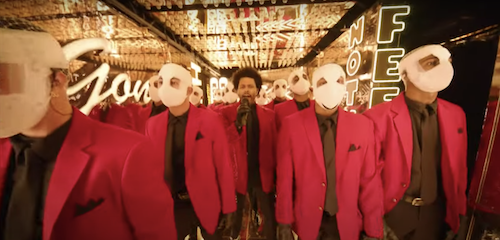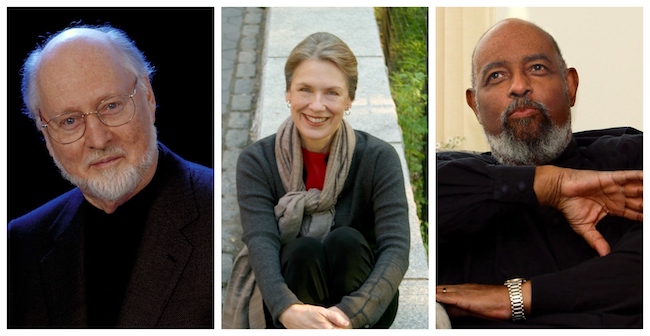by Jarrett Hoffman
HALFTIME SHOW: THE WEEKEND
Whether or not Super Bowl LV interested you at all (and many football fans found that it did not), there’s something amazing about an event that routinely draws over 100 million viewers, and the national conversation that creates. It means that once a year, seemingly the whole country is talking about not just a sporting event, but also music — or at least performance in all its aspects — thanks to the hype and spectacle of the halftime show.
Last night’s featured artist was Canadian singer-songwriter and producer Abel Makkonen Tesfaye, known as The Weeknd (the name is spelled that way for copyright reasons, the artist has explained).
His Super Bowl performance did not include an exit via helicopter (see Diana Ross, 1996), or an entrance atop a 16-foot tall, 1,600-pound puppet lion (Katy Perry, 2015).
As pop music critic Jon Caramanica wrote in The New York Times, “What would ordinarily be a hyperchoreographed spectacle with countless moving parts was instead something more focused and, at times, unnervingly intimate…the Weeknd found several ways to make the performance appear small, a kind of secret whispered in front of an audience that tops 100 million.”
The performance also dabbled in the bizarre, especially the scene featuring dancers stumbling into each other, their faces covered in bandages — made all the more chaotic by the shaky, hand-held camera. It felt like a crossover between the mainstream and the avant-garde.
Read the Times article to learn why all that was fitting not only for pandemic restrictions, but for “pop music’s greatest hermit,” someone who’s also quite leery of celebrity worship. And watch the full performance here.
ROMANCE WITH THE ASO
With Valentine’s Day coming up, if you can’t quite manage that most spectacular offering of love — say, a ride together on a giant robotic lion — the Akron Symphony has the next best thing. Support local music by sending your special someone a musical Valentine’s Day card featuring an embedded video performance from an ASO musician. The ordering deadline is February 10, and cards will be emailed on the 14th — rates and more info here.
TODAY’S ALMANAC, “ALL-AMERICAN”
Margaret Brouwer — chair of the composition department at CIM from 1996 to 2008, founder of the Blue Streak Ensemble, and recipient of many awards including a Guggenheim Fellowship — was born on this date in 1940 in Ann Arbor, MI.
Brouwer has often been inspired by the environment, and that was certainly the case with her oratorio Voice of the Lake, premiered in its revised version in 2018 in Cleveland. The piece portrays both the magical side of Lake Erie as well as its many environmental problems — and the work that’s being done to solve them. Watch a live performance of Parts I, II, III, and IV, and read Mike Telin’s preview article about the revised version of the oratorio here.
Brouwer’s current commission, to be premiered by the American Wild Ensemble in June, also relates to the natural world. As she told us in an article last year about how composers have responded to the pandemic, the piece evokes fear on the part of animals whose habitats and lives are being threatened. But since COVID-19 arrived, it has also drawn on human fear. “Perhaps the greatest part of the fear — for us and for the animals — is not knowing when or if the threat will strike,” Brouwer said.
Another composer to celebrate today is John Williams, born on February 8, 1932 in Queens, NY. You very likely know at least a few of his classic film scores, such as Star Wars, Indiana Jones, E.T., Schindler’s List, Jaws, Jurassic Park, and Harry Potter. He’s also composed music for several Olympic games, as well as a long list of concert works, including many concertos.
Here’s one of those for today: The Five Sacred Trees, inspired by ancient Celtic mythology, and written for the New York Philharmonic and principal bassoon Judith LeClair for the orchestra’s 150th anniversary. LeClair recorded the work in 1997 with the London Symphony Orchestra, conducted by none other than John Williams (who in that arena of music-making notably led the Boston Pops for thirteen years). Listen to the concerto here.
(As announced last week in a press release, The Cleveland Orchestra’s “John Williams Conducts” concert, previously slated for April 26, has been cancelled due to the pandemic, as with all in-person concerts in the next few months. “We are still actively looking to schedule Mr. Williams to perform with The Cleveland Orchestra at a future date,” president and CEO André Gremillet wrote.)
Now we pass the baton to the pioneering figure of James DePreist, who died on this date in 2013 in Scottsdale, AZ, and who achieved international renown in a time when Black conductors were rare in the world of classical music.
His most famous position was as music director of the Oregon Symphony (1980-2003). DePreist was heralded for transforming the ensemble from a part-time, regional group to an esteemed one, whose recordings under his leadership were widely acclaimed, including albums devoted to Rachmaninoff and Stravinsky. Listen to their recording of the first movement of Rachmaninoff’s Symphony No. 2 here.
He also served as music director of the Orchestre Symphonique de Québec, the Malmö Symphony, and the Orchestre Philharmonique de Monte Carlo, as permanent conductor of the Tokyo Metropolitan Symphony Orchestra, and as director of orchestral and conducting studies at the Juilliard School.
As Allan Kozinn wrote in an obituary for DePriest in The New York Times, the conductor “was reluctant to be seen as a role model on the basis of his race, rather than purely for his musical accomplishments,” but he also understood the impact he could make as a world-renowned Black musician, just like his aunt, the vocalist Marian Anderson.
Using that power was something he did not take lightly. “I think if I’m seen as a role model, I would like it to be for conducting the subscription weeks, and not just the concert at the Apollo,” he said, referring to a performance he turned down at the Apollo Theater in New York with the Boys Choir of Harlem and the Modern Jazz Quartet. He was wary of tokenist programs, “especially if it’s the only time you see black artists or hear works by black composers.”
No doubt his voice would be a valuable one in classical music today.





